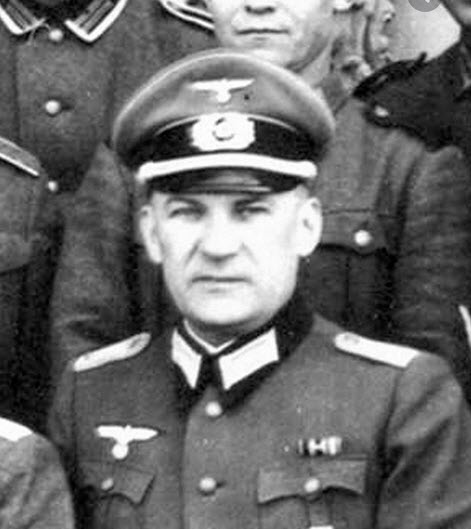Lieutenant Albert Battel (21 January 1891 – 1952) was a German lawyer and Army lieutenant who resisted the Nazi plans for the 1942 liquidation of the Przemyśl Jewish ghetto.
 Battel’s stance against the liquidation wasn’t recognized until long after his death, when the Israeli researcher and lawyer Dr. Zeev Goshen found out and brought it to wider attention. On 22 January 1981, nearly three decades after his death, Battel was recognized as Righteous Among the Nations. Righteous Among the Nations (Hebrew: חֲסִידֵי אֻמּוֹת הָעוֹלָם) is a honorific used by the State of Israel to describe non-Jews who risked their lives to save Jews from extermination during the Holocaust.
Battel’s stance against the liquidation wasn’t recognized until long after his death, when the Israeli researcher and lawyer Dr. Zeev Goshen found out and brought it to wider attention. On 22 January 1981, nearly three decades after his death, Battel was recognized as Righteous Among the Nations. Righteous Among the Nations (Hebrew: חֲסִידֵי אֻמּוֹת הָעוֹלָם) is a honorific used by the State of Israel to describe non-Jews who risked their lives to save Jews from extermination during the Holocaust.
Life before WWII
On 21 January 1891, Battel was born in Klein-Pramsen, a village in Prussian Silesia. Today, this area is a part of Poland and the official name of the village is Prężynka, but back then, Prussian Silesia was a part of the German Empire.
As a young man, Battel served in World War I. After his service, he studied economics and jurisprudence in Munich and Breslau.
When World War II broke out in 1939, Battel was already 48 years old.
WWII
Saving Jews from the Przemyśl ghetto
When the SS prepared to carry out their first large-scale liquidation (“resettlement”) action against to Jews of Przemyśl in southern Poland in the summer of 1942, Oberlautnant Battel was 51 years old and station in Przemyśl, where he, a reserve officer, had been appointed adjutant to Major Max Liedtke, the local military commander.
As the SS was getting ready for the liquidation, Oberlautnant Battel – in concert with his superior – ordered the bridge over the River San blocked. This was the way the SS was intendting to use to get into the Jewish ghetto in Przemyśl. As the SS commando attempted to cross the bridge, the sergant major in charge of the bridge threatened to open fire on the SS men unless they withdrew. These astonishing acts of disobedience took place in broad daylight and were witnessed by local inhabitants of Przemyśl – who reportedly were much amazed.
Later in the afternoon, an army detachment under the command of Oberlautnant Battel broke into the ghetto (the area had been cordoned-off by the German authorities) and used their army trucks to evacute as many Jews as possible. The Jews where taken to the barracks where the local military command lived, and placed under the protection of the Wehrmacht. Because of t his, the evacuated Jews were saved from being sent to the concentration camp in Belzec.
The Jews that the army detachment under Oberlautnant Battel didn’t manage to save from the ghetto were “resettled” in the following days. One of them were the Judenrat Dr. Duldig.
Aftermath for Battel
Naturally, this act of disobedience did not go unnoticed, and SS authorities began investigating Battel – but in secret and without taking any acute steps to punish him or even let him know he was under investigation.
The investigation showed that Battel, a member of the Nazi Party since May 1933, already had a reputation for friendly behaviour towards Jews.
- Before the war, Battel had been indicted before a party tribunal after having lent money to Jewish colleague.
- While serving in the army at Przemyśl, Battel had recieved an offical reprimant for cordially shaking the hand of a Jew. (Dr. Duldig, the Chairman of the Jewish Council.)
After the events in July 1942, Battel’s behaviour attracted the attention of the very top of the Nazi hierarchy, including Reichsführer-SS Heinrich Himmler. When the investigation was finnished, Himmler sent the documentation on to Martin Bormann, who was chief of the Party Chancellery and generally regarded as Adolf Hitler’s right-hand man. In a letter accompanying the information about Battel, Himmler vowed to to have Battel expelled from the party and arrested immediately after the war. Thus, nothing was done against Battel during the war.
In 1944, as the war was still roaring on, Battel was discharge from military service due to heart disease. He went back home to Breslau, but didn’t get much chance to rest his heart since he was drafted into the Volkssturm and eventually ended up as a Soviet captive.
After being released from captivity, Battel settled in West Germany, where a denazification court banned him from going back to practicing law. In 1952, the 61 year old Battel died in Hattersheim am Main, a town near Frankfurt.
This article was last updated on: December 3, 2020
